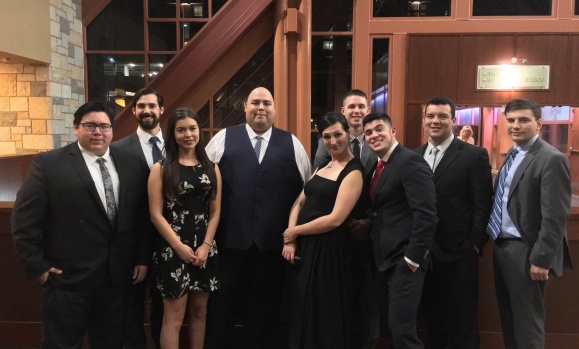News
» Go to news mainProfessor Naiomi Metallic and eight Schulich Law students shared ideas at the 28th annual Indigenous Bar Association fall conference

In October, Schulich School of Law Professor Naiomi Metallic and eight members of the Dalhousie Indigenous Law Students’ Association attended the 28th annual Indigenous Bar Association conference. The theme, “Redefining Relationships: With or Without You,” created an opportunity for industry, government, academics, and legal practitioners to discuss how to move forward with a commitment to redefine Canada and its relationship with Indigenous peoples’ lands, law, and institutions.
The conference was held at the River Rock Casino and Resort and the Musqueam Cultural Centre in Vancouver. Metallic sat on two panels; the first was with a group of Indigenous academics where she presented a draft paper looking at whether Canada should pass legislation recognizing Indigenous self-governance.
The second panel was a group of women assembled by the Canadian Human Rights Commission, who talked about Indigenous women’s issues in a human rights context. Metallic spoke about the use of human rights law to address inequities in funding and services in First Nations communities and possibly a mechanism to advance arguments for self-government through an equality lens.
The students who attended the conference, most of whom are members of the Indigenous Blacks & Mi'kmaq Initiative, were Ben Barnaby, Houston Barnaby, Cody Blanchard, Richard Kulesza, Mike Megalli, Armand Paul, Marissa Prosper, and Mark Prosper. “We’ve never had that many students attend the conference from Schulich Law,” says Metallic. In fact, a record 80 students in total were there representing law schools from across the country.
Third-year student Richard Kulesza, who is from Winnipeg and part of the Red River Métis community, enjoyed taking part in a Blanket Exercise during IBA Student Day and listening to Inuit throat singing. He also found the presentation given by Jean Teillet, who specializes in Indigenous rights law and is a founder of the Métis Nation of Ontario and the National Aboriginal Moot, to be powerful.
It was nice to establish a bond with a community of great Indigenous leaders. Their work gave me faith in moving forward on improving Indigenous communities when I practice law. – Third-year law student Richard Kulesza
“The best part of the conference was talking with other students about our law courses and our frustrations of being an Indigenous person in a non-Indigenous student body,” says Kulesza. “It was also nice to establish a bond with a community of great Indigenous leaders. The panelists talked about what has been effective Indigenous policy and what needs to change. Their work gave me faith in moving forward on improving Indigenous communities when I practice law.”
First-year student Marissa Prosper, who is a Mi’kmaq from Pictou Landing First Nation in Nova Scotia, was moved by Senator Murray Sinclair’s opening keynote address. Sinclair said that in some ways, the Senate was like Canada’s Council of Elders, who pass down the law and guide their people. He stated that negative policy has in turn created negative consequences, such as the residential school system. He also talked about how the Crown will continue to have significant impact on the lives of Indigenous people, so they need to build nation-to-nation relationships with the Crown.
Sinclair believes modernizing the Senate could mean including more Indigenous representation to contribute to reconciliation between Indigenous and non-Indigenous people. "His voice was powerful,” says Prosper. “He received a standing ovation.”
Aboriginal and Indigenous lawyers are the voices for their people. I want to be able to help by continuing to contribute to reconciliation. – First-year law student Marissa Prosper
When talking to other students about what their Indigenous societies did for their law schools, the Schulich Law students realized that they were the only ones using “Aboriginal” in their society’s name—effective immediately, DALSA is now DILSA, the Dalhousie Indigenous Law Students’ Association. They also noted that other law schools did more fundraising through the making and selling of Indigenous food, which is something they’re considering.
Prosper was inspired by the panelists’ accomplishments and their stories about how they got to where they are today. “Senator Sinclair said the elders have been there and fought the fight, and now it’s time for us to pick up the fight as we fulfil a dream that others before us had for our people,” she says. “Aboriginal and Indigenous lawyers are the voices for their people. I want to be able to help by continuing to contribute to reconciliation.”
Like her students, it was also Metallic’s first time attending the IBA conference. “We met fabulous Indigenous lawyers, academics, and students,” she says. “There was a beautiful element of incorporating traditional culture and story. It was a wonderful recharging and re-energizing event.”
Recent News
- The Schulich School of Law ft in "Top 10 Law Schools in Canada in 2024"
- Professor Emeritus Wayne MacKay ft in "'Enough is enough': N.S. Teachers Union prepared to strike if no progress on 'priority areas'"
- Professor Emeritus Wayne MacKay ft in "Livestreamed transphobic assault in Hamilton shows why Canada must be tougher on hate, expert says"
- Assistant Professor Suzie Dunn ft in "'Ground is shifting' for social media giants, says federal justice minister pushing Online Harms Act"
- Professor Emeritus Wayne MacKay ft in "Maritime Noon Phone‑In: Three experts discuss and answer questions about proposed legislation in NB called the Compassionate Intervention Act"
- Professor Emeritus Wayne MacKay ft in "Social media giants face scrutiny for cyberbullying. How does this affect Islanders?"
- The Schulich School of Law ft in "The Best Law Schools In Canada 2024"
- Professor Emeritus Wayne MacKay ft in "The Todd Veinotte Show, April 4, 2024"
